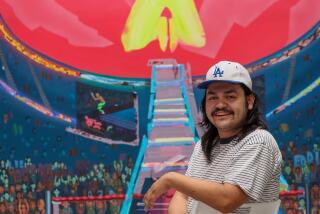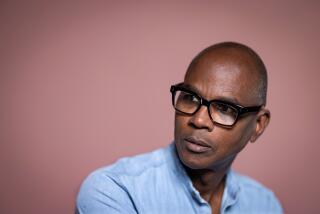New Yorkers hustle to catch Banksy street art
NEW YORK -- New Yorkers can visit thousands of priceless works of art just about any time they want, meticulously staged and presented at the Metropolitan Museum of Art or the Whitney.
But this month, they seem to prefer to trek across the city’s boroughs, ignoring the smell of urine, to catch glimpses of the outdoor graffiti art of Banksy, the infamous British street artist.
Seemingly without any advance notice, or permission from anyone, Banksy has set up a residence called Better In Than Out on the streets of New York for the month of October, unveiling one piece of art a day, which fans can follow on a website, complete with an audio guide.
He began on Oct. 1 with a mural in Manhattan, depicting one boy standing on the back of another, spray-painting a sign that says “Graffiti is a crime.” His most recent creation was a fiberglass sculpture of a boy shining the oversized shoes of Ronald McDonald, which was unveiled in Queens but will be moved outside a different McDonald’s around the city every day.
Though it appeared Saturday, crowds still gathered Wednesday around a mural, “Concrete Confessional,” painted inside a concrete block near Cooper Union, the art, engineering and architecture school on the East Side of Manhattan. In one hollow section of the block, Banksy had painted a priest; in the other, a man giving confession. (There appeared to be human feces on the street a step away, though likely not as part of the artwork.)
The images were facing a busy street, but so many people came to see the artwork that authorities brought in a backhoe to turn it around so that it would face the sidewalk, perhaps averting a Banksy-related car crash.
Cyrus Blaze, 19, a student at Cooper Union, watched the whole process and took a video of it with his phone, which he posted on Instagram. He thinks the artist’s work is funny and smart, but other students aren’t so forgiving.
“A lot of people are pissed off because there are so many crowds of people coming around our school, acknowledging Banksy but not acknowledging our school’s issues,” he said. (Cooper Union has provided its students with full-tuition scholarships, but will be ending that policy next fall because of financial issues).
Some students, including Blaze, think that the man in the confessional mural looks a bit like the embattled president of Cooper Union, Jamshed Bharucha. Then someone altered the image of the priest, adding a fuzzy white beard and Cooper Union’s logo to his necklace, to make him look like the founder of Cooper Union, Peter Cooper, who was caricatured for his fuzzy white beard.
“People saw it an an opportunity to bring awareness to our school,” Blaze said of the alterations, adding that Banksy might have been trying to make a point about Cooper Union in the first place.
Much of Banksy’s New York work has been tagged or added to by other graffiti artists hoping to ride the artists’ fame.
Some New Yorkers have tried to use Banksy’s work, which is free to see, to earn some extra dough. A group of men in East New York put a piece of cardboard over a Banksy mural of a stenciled beaver, and charged visitors $20 to see it, according to the New York Post.
It is difficult to tell whether Banksy’s work in New York has some sort of message or not -- like much of his work, its messages are tongue-in-cheek.
A truck filled with squealing stuffed animals, titled “Sirens of the Lambs,” was unleashed on New York last Friday, and an audio guide on Banksy’s website says it is either about the “casual cruelty” of the meat industry or “something vague and pretentious” about the loss of childhood innocence.
Four professional puppeteers are inside the truck, moving the animals, and get only one bathroom break a day, the audio guide says, “proving that the only sentient beings held in lower esteem than farm livestock are mime artists.”
The breathy voice is similarly vague about Banksy’s most recent effort, the McDonald’s figure. Calling Ronald McDonald the second-most sculpted figure in history, after Jesus Christ, it asks whether the sculpture “is a critique of the heavy labor required to sustain the polished image of a mega corporation.... Does this hero have feet of clay?” As small cheers in the background play alongside creepy carnival music, the voice points out that the face of the sculpture is very similar to one sculpted of Hermes, by Praxiteles, in 340 BC.
“Is this a wry, oblique reference to Greek mythology, or did the artist have such difficulty trying to sculpt the face that he simply plopped on the nearest replica bust he could find? We will never know,” the voice says. Then, a beat later, after the music stops, he whispers: “It’s the second one.”
ALSO:
New Jersey expected to vote against partisanship
Special prosecutor to reexamine Maryville rape case
‘100% authentic’ Banksy artworks, $60 each, in N.Y.; only 7 sold?
More to Read
Sign up for Essential California
The most important California stories and recommendations in your inbox every morning.
You may occasionally receive promotional content from the Los Angeles Times.











